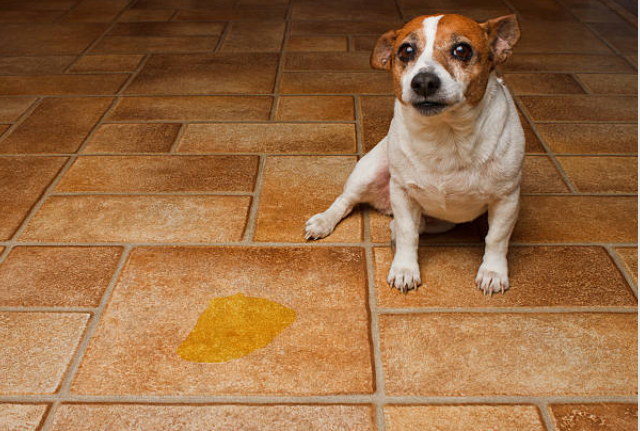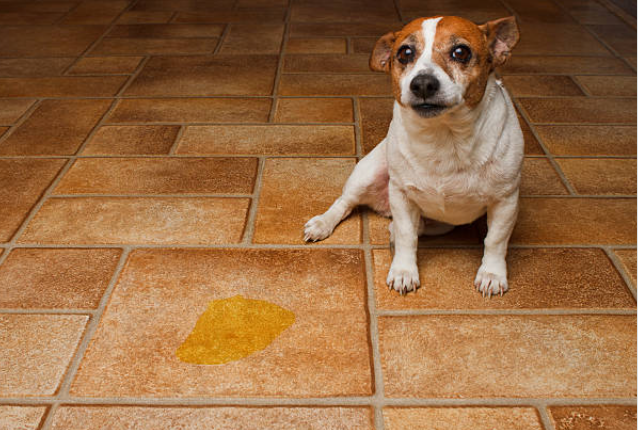If you’re a dog owner, you’ve probably noticed your dog vomiting from time to time. One of the more concerning types of vomiting is when your dog throws up yellow bile. But why a dog vomits yellow bile is a question that many pet owners ask.
Yellow bile is a digestive fluid produced by the liver and stored in the gallbladder. It helps break down fats in your dog’s food.
When your dog vomits yellow bile, it can be alarming. However, understanding the reasons behind it can help ease your concerns and guide you on what to do next.
In this article, we’ll explore the common causes of bile vomiting, what it might mean for your dog’s health, and when you should consult a veterinarian.
Whether it’s due to an empty stomach or something more serious like gastrointestinal issues, we’ll cover the key reasons behind why your dog might be vomiting bile.
Understanding this issue is crucial for ensuring your dog stays healthy and happy.
What is Yellow Bile?
Yellow bile is a digestive fluid produced by your dog’s liver. It’s stored in the gallbladder and released into the small intestine to help break down fats during digestion.
The bile itself is usually a yellow or greenish color. It’s made up of water, bile salts, cholesterol, and other substances.
When a dog vomits yellow bile, it often means that bile has been produced but wasn’t able to do its job. The vomit is typically frothy and has a distinct yellow or greenish hue.
Bile in vomit can be a sign that food hasn’t passed through the stomach and intestines properly, or that the stomach is empty.

Why a dog vomits yellow bile can be tied to how the digestive system is functioning. When there’s no food to digest, bile can irritate the stomach lining, leading to vomiting.
This is often why you may notice your dog vomiting bile first thing in the morning or after a long period without eating.
In short, bile is essential for digestion, but it can cause problems when it doesn’t get a chance to do its job. If your dog vomits bile occasionally, it’s usually not a cause for alarm.
However, frequent vomiting of yellow bile can indicate a more serious issue, requiring veterinary attention.
Common Causes of Yellow Bile Vomiting in Dogs
There are several reasons why a dog vomits yellow bile. Some causes are relatively harmless, while others could signal a more serious issue.
Understanding the underlying factors can help you determine whether you need to take action or consult a vet. Here are the most common causes:
1. Empty Stomach (Hunger Pukes)
One of the most common reasons dogs vomit yellow bile is simply because their stomach is empty.
When your dog’s stomach hasn’t had food for a while, bile can build up and irritate the stomach lining, leading to vomiting.
This is often seen in the morning, after your dog has gone a long time without eating overnight.
Dogs who are fed infrequently or on irregular schedules are more likely to experience this.
It’s generally harmless but can be managed by feeding your dog smaller, more frequent meals throughout the day.
2. Dietary Issues
Another frequent cause of bile vomiting is related to your dog’s diet. Eating too much, eating too quickly, or consuming something that doesn’t sit well with their stomach can cause irritation. Rich, fatty, or spicy foods, for instance, can lead to bile being produced in excess.
Food allergies or sensitivities may also cause your dog to vomit yellow bile. Certain ingredients in their food could be irritating their digestive system, leading to an upset stomach.
If your dog vomits bile after eating a specific food, it’s a good idea to adjust their diet or switch to a hypoallergenic formula.
3. Gastrointestinal Disorders
Gastritis, an inflammation of the stomach lining, is another common cause of vomiting yellow bile.
When the stomach lining is irritated or inflamed, it can lead to bile being expelled. In some cases, dogs with ulcers may also vomit bile as their stomach struggles to process food.
Another condition to consider is bilious vomiting syndrome (BVS). This occurs when bile is refluxed into the stomach and causes vomiting, typically early in the morning or after periods without food.
Gastric reflux and other digestive issues can also lead to bile being thrown up.
4. Motion Sickness
If your dog suffers from motion sickness, it can also lead to vomiting, including the production of yellow bile. This is common during car trips or long travels.
The movement can upset your dog’s stomach, causing them to vomit bile before or during the trip.
5. Stress or Anxiety
Stress or anxiety can impact your dog’s digestive system and lead to bile vomiting. Dogs are sensitive to changes in their environment, such as moving to a new home or changes in their routine. The stress of separation or travel can also trigger vomiting, including yellow bile.
Certain breeds are more prone to stress-induced vomiting, so if your dog experiences anxiety frequently, this could be the cause.
Calming techniques or products, like anxiety wraps or pheromone diffusers, may help.
6. Other Health Concerns
While less common, vomiting yellow bile can also be linked to more serious health conditions. These include liver disease, pancreatitis, or gastrointestinal obstructions.
If your dog is vomiting regularly and showing other signs of illness such as lethargy, diarrhea, or changes in appetite, it’s time to seek veterinary care.
Bile vomiting can sometimes indicate liver dysfunction or other organ-related issues. In such cases, early diagnosis and treatment are key to managing the condition.

When Should You Be Concerned?
If your dog vomits yellow bile occasionally, it’s usually not a cause for alarm. However, frequent or severe vomiting may indicate a more serious health problem.
Understanding why a dog vomits yellow bile and when to be concerned is important for your pet’s well-being.
1. Persistent Vomiting
Occasional bile vomiting is often linked to an empty stomach or minor digestive upset. But if your dog is vomiting yellow bile multiple times a day or several days in a row, it’s worth investigating further.
Repeated vomiting could signal an underlying health issue like gastritis, gastrointestinal disorders, or even liver problems.
2. Other Symptoms
If vomiting yellow bile is accompanied by other symptoms, it may be time to contact your vet. Signs such as lethargy, loss of appetite, diarrhea, or abdominal pain could indicate more serious issues like pancreatitis or intestinal blockages.
If your dog is also showing these symptoms, don’t wait for the vomiting to stop on its own—seek medical advice immediately.
3. Vomiting Blood or Brownish Substance
If the vomit contains blood or has a dark, coffee-ground appearance, this is a clear sign of a more serious condition, such as bleeding ulcers.
Vomiting blood or a dark brown substance (indicating partially digested blood) is a medical emergency. If this happens, take your dog to the vet right away.
4. Weight Loss or Dehydration
Frequent vomiting of yellow bile can lead to dehydration, especially if your dog is not drinking enough water.
If your dog shows signs of dehydration, such as dry gums, lethargy, or sunken eyes, it’s important to seek veterinary care.
Weight loss can also occur with chronic vomiting, which may indicate a more serious health problem like a liver disease or gastrointestinal infection.
5. Changes in Behavior
Any sudden changes in your dog’s behavior, such as increased irritability or aggression, could be linked to pain or discomfort from an underlying illness.
If your dog becomes unusually quiet or refuses to interact, this could indicate that they are feeling unwell and need immediate veterinary attention.
When to See a Vet
In general, if vomiting yellow bile becomes frequent or is accompanied by any of the symptoms mentioned above, it’s time to visit the vet.
It’s always better to err on the side of caution. Early diagnosis can help prevent more serious conditions from developing.
If you’re unsure why your dog is vomiting yellow bile, your vet will be able to provide guidance and perform tests to get to the root of the problem.
By staying alert and monitoring your dog’s health closely, you can ensure that they get the treatment they need, whether the cause is something minor or more serious.

How to Prevent Yellow Bile Vomiting
If you’re concerned about why a dog vomits yellow bile, the good news is there are several things you can do to reduce the likelihood of your dog experiencing this issue.
Preventing bile vomiting often comes down to diet, feeding habits, and managing your dog’s health. Here are some key tips to help you keep your dog comfortable and healthy:
1. Feed Smaller, More Frequent Meals
One of the easiest ways to prevent yellow bile vomiting is by ensuring your dog doesn’t go too long without food.
Dogs that eat on an empty stomach are more likely to produce excess bile, which can irritate the stomach lining.
Feeding your dog smaller meals more frequently rather than one or two large meals a day can help maintain a more stable digestive process.
If your dog struggles with vomiting bile in the mornings, try giving them a small snack before bedtime. This can help keep their stomach from being empty overnight.
2. Choose High-Quality, Easily Digestible Food
The type of food your dog eats plays a significant role in their digestive health. A diet that is rich in high-quality, easily digestible ingredients will be easier on their stomach.
Avoid foods that are too fatty, spicy, or rich in additives, as these can irritate the digestive tract and trigger bile vomiting.
If you suspect your dog may have food sensitivities or allergies, consider switching to a hypoallergenic or limited-ingredient diet.
This can help identify and eliminate any ingredients causing irritation. You may also want to consult your vet for recommendations on the best diet for your dog’s specific needs.
3. Slow Down Their Eating
Some dogs tend to eat too quickly, which can lead to indigestion and vomiting. If your dog eats too fast, they may swallow air along with their food, causing bloating and discomfort. This can increase the likelihood of vomiting yellow bile.
To slow down your dog’s eating, you can try using a puzzle feeder or a slow-feed bowl. These bowls have raised sections inside that force your dog to eat more slowly, allowing their stomach to process the food more effectively.
4. Manage Stress and Anxiety
If stress or anxiety is a factor in your dog’s vomiting, it’s important to address these issues. Stress can cause digestive upset and lead to bile vomiting.
Try to create a calm and stable environment for your dog, especially during stressful situations like car rides, trips to the vet, or changes in routine.
There are various ways to help your dog manage stress, including using calming products like pheromone diffusers, anxiety wraps, or natural calming supplements.
You might also consider taking your dog for regular exercise to burn off excess energy and reduce anxiety.
5. Regular Veterinary Check-Ups
Routine vet visits are essential for detecting and preventing any health problems that might contribute to bile vomiting.
Regular check-ups allow your vet to monitor your dog’s overall health, check for any gastrointestinal issues, and catch early signs of more serious conditions like liver disease or pancreatitis.
If your dog is prone to vomiting yellow bile, your vet might recommend blood tests, X-rays, or ultrasounds to rule out more serious conditions.
They can also provide tailored advice on diet, feeding habits, and any supplements that might benefit your dog’s digestive health.
By following these preventive measures, you can help reduce the chances of why a dog vomits yellow bile and keep your dog feeling their best.
A balanced diet, routine vet care, and managing stress are all key factors in maintaining your dog’s digestive health and preventing recurring vomiting.

Treatment Options for Yellow Bile Vomiting
If your dog is frequently vomiting yellow bile, the right treatment depends on the underlying cause.
While some causes may resolve with simple changes to diet or routine, others may require medical intervention.
Knowing why a dog vomits yellow bile can help guide you toward the appropriate treatment. Here’s what you can do to help your dog recover:
1. At-Home Care
For occasional bouts of bile vomiting, you can try managing the situation at home. The first step is ensuring that your dog stays hydrated.
Vomiting can lead to dehydration, especially if it’s happening frequently. Provide fresh water at all times, but don’t force your dog to drink large amounts at once, as it could trigger more vomiting.
You can also try fasting your dog for 12-24 hours (depending on their age and health). This gives their stomach a chance to rest and heal.
After fasting, gradually reintroduce food with small, bland meals like boiled chicken and rice. This can help ease their digestive system back into normal function.
2. Medications
If your dog’s bile vomiting is more persistent or caused by inflammation, your vet may prescribe medications to help reduce the vomiting and soothe the stomach. Common medications include:
- Anti-nausea drugs to control vomiting
- Antacids or H2 blockers to reduce stomach acid and prevent further irritation
- Prokinetic agents to help with gastric motility and reduce the chance of bile reflux
If your dog’s vomiting is related to an infection or parasite, your vet may also prescribe antibiotics or dewormers to clear up the issue.
3. Treating Underlying Conditions
If why your dog vomits yellow bile is linked to a more serious condition, like pancreatitis, liver disease, or a gastrointestinal blockage, more intensive treatment will be necessary.
For example, in cases of pancreatitis, your dog may need to stay at the vet’s office for IV fluids, pain management, and a special diet until they stabilize.
In cases of gastrointestinal obstructions, surgery may be required to remove the blockage. If liver disease or other organ issues are to blame, your vet will create a treatment plan that may involve special medications, dietary changes, or long-term management.
4. Dietary Adjustments
As part of the treatment, your vet may recommend a specific diet to help your dog’s digestive system heal. Foods that are easy to digest and low in fat are typically recommended for dogs with gastric issues. Prescription diets or bland diets may be suggested for dogs with chronic vomiting.
In some cases, switching to a more specialized food, such as one designed for dogs with bilious vomiting syndrome, can help reduce the frequency of bile vomiting.
5. Ongoing Monitoring
Once your dog’s vomiting is under control, it’s important to continue monitoring their condition. Regular vet check-ups can ensure that any underlying issues are being managed properly.
Your vet may recommend blood tests or imaging to keep track of liver function, gastrointestinal health, or any other conditions that could contribute to bile vomiting.
The treatment for why a dog vomits yellow bile depends on the cause. In mild cases, simple dietary changes or medications can provide relief.
However, if your dog’s vomiting is a sign of a more serious condition, professional veterinary care will be necessary?
By taking the appropriate steps, you can help your dog recover quickly and prevent future episodes of vomiting.
Always consult with your vet if you are unsure about your dog’s health or the best course of action.

Conclusion
Understanding why a dog vomits yellow bile is key to managing your dog’s health. While occasional bile vomiting is often harmless, frequent or severe episodes could point to an underlying issue that requires attention.
By recognizing the causes and symptoms, you can make informed decisions about your dog’s care and well-being.
For many dogs, bile vomiting may be due to an empty stomach or dietary issues, both of which can be addressed with small changes to feeding habits.
If stress or anxiety is contributing to the problem, calming solutions like anxiety wraps or routine adjustments may help.
However, when vomiting becomes persistent or is accompanied by other symptoms like lethargy, blood, or weight loss, it’s important to consult with your vet.
Your veterinarian will be able to assess why your dog vomits yellow bile, run necessary tests, and recommend the best course of treatment.
From medications to dietary changes, there are several ways to manage bile vomiting and ensure your dog’s digestive system stays healthy.
In the end, maintaining a balanced diet, providing regular veterinary check-ups, and managing stress are all vital steps in preventing yellow bile vomiting in dogs.
By staying proactive and informed, you can keep your dog feeling their best and enjoy many happy, healthy years together.
Related Posts:
How to treat dog diarrhea and vomiting
Why puppy hiccups often
FAQs:
1. Why does my dog vomit yellow bile in the morning?
Dogs often vomit yellow bile in the morning when their stomach is empty. Bile builds up overnight and can irritate the stomach lining, leading to vomiting. This is most common in dogs that go long periods without food.
2. Is yellow bile vomit always a sign of illness?
Not always. Occasional yellow bile vomiting can be normal, especially if your dog hasn’t eaten for a while or if they ate something that upset their stomach. However, frequent or severe bile vomiting could indicate a gastrointestinal problem, liver issues, or other health concerns.
3. What can I do if my dog keeps vomiting yellow bile?
If your dog is vomiting yellow bile regularly, start by adjusting their feeding routine—offer smaller, more frequent meals. If vomiting continues or is accompanied by other symptoms like lethargy or diarrhea, consult a veterinarian. Your vet may perform tests to identify any underlying conditions.
4. Can stress cause a dog to vomit yellow bile?
Yes, stress and anxiety can upset your dog’s digestive system, leading to bile vomiting. Changes in routine, travel, or separation anxiety can trigger this. Reducing stress through calming products, regular exercise, and a stable environment can help prevent bile vomiting caused by anxiety.
5. How can I prevent my dog from vomiting yellow bile?
You can prevent yellow bile vomiting by feeding your dog smaller, more frequent meals, choosing easily digestible food, and avoiding long periods without food. Slowing down their eating with puzzle feeders or slow-feed bowls can also help. Regular veterinary check-ups are important to detect any health issues early.
6. Should I be concerned if my dog vomits yellow bile and has diarrhea?
Yes, if your dog is vomiting yellow bile and has diarrhea, it could indicate an infection, gastrointestinal upset, or more serious conditions like pancreatitis or gastrointestinal obstruction. It’s important to contact your vet for advice and possible testing.
7. Can my dog vomit yellow bile if they have a food allergy?
Yes, food allergies or sensitivities can lead to gastrointestinal upset, including vomiting yellow bile. If you suspect a food allergy, try switching to a hypoallergenic or limited-ingredient diet. Consult your vet to identify the specific food causing the issue.
8. When should I take my dog to the vet for yellow bile vomiting?
If vomiting persists for more than 24-48 hours, or if your dog shows additional signs of illness such as lethargy, blood in the vomit, or weight loss, it’s time to see your vet. A vet can determine why a dog vomits yellow bile and rule out any serious health issues.
9. Can liver disease cause a dog to vomit yellow bile?
Yes, liver disease or dysfunction can cause bile to build up, leading to vomiting yellow bile. If your dog shows signs like jaundice, fatigue, or loss of appetite along with vomiting, it’s important to consult your vet for a full evaluation.
10. Is there a specific food that can help with bile vomiting?
Yes, a bland, easily digestible diet can help soothe your dog’s stomach and reduce bile vomiting. Foods like boiled chicken and rice are often recommended temporarily.
Long-term, your vet might suggest a special prescription diet designed for digestive health.


Pingback: Do Dogs Get Bored of Their Food? Keep Mealtime Exciting - Tech Promot